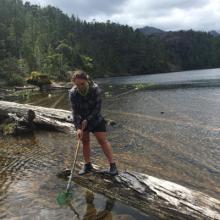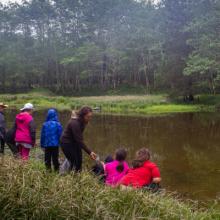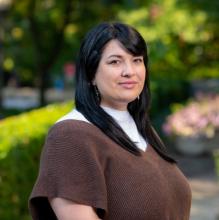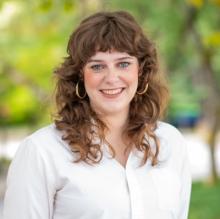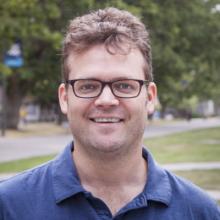PSI scholar Roseanna Gamlen-Greene initially decided on her doctoral research because there was a potential conservation issue on Haida Gwaii that needed to be solved: “why did people see toads around less?” But from the moment she first visited, she was impressed by the connection that the community of Haida Gwaii have to the health of their ecosystems.
“Seeing how much some people cared about toads and also their importance to the Haida Nation inspired me to research this endangered species,” said Gamlen-Greene who’s become known to the community as the toad lady.
Roseanna credits her upbringing on the west coast of the South Island, in New Zealand, in a little old miner's cottage on a sea cliff, as motivation for her work today. “Also, having a mother who was really passionate about conservation was an instrumental push in that direction. She even took me to parliament in her backpack as a baby while pursuing conservation issues. It's always been part of me to find a purpose in conservation.”
In addition to her ecological research that is trying to figure out why toads are declining, a great part of Roseanna's work concerns facilitation of community action around conservation issues, either through efforts to monitor toad populations, find and protect breeding sites, or educate children about the importance of preserving endangered species.
An example of this was when she was on Haida Gwaii during the first year of her research. At the time, she was speaking to lots of people in the community, trying to find out where they'd seen toads, when she came across the Richardson’s, who lived in a ranch near Tlell.
“I found a toad breeding site on their property, and they were interested in learning how to protect it, so I suggested delaying harvesting and leaving a buffer around the pond so the baby toads wouldn't be munched up by the harvesters.” A few months later, when she was driving by, there was a large buffer around the Richardson’s pond. This was the first time something tangible emerged as a result of her research.
It is Roseanna’s hope that her doctoral work will help define strategies on how to best conserve the native toads on Haida Gwaii. “I hope that the community monitoring of toads will continue even when I leave. I hope the children I visit in schools will continue to look out for toads as they grow older and that they will pass on their knowledge to their community. I am so grateful to do research in a community that really cares about conservation – it is a dream come true. I hope that my research aids the incredible community of Haida Gwaii in their conservation efforts.”
Read more about Roseanna's public outreach work here.
Research Description
Roseanna Gamlen-Greene is a third-year PhD Candidate. She is currently researching conservation biology of amphibians on Haida Gwaii, British Columbia, Canada as part of her PhD. Her work involves tromping around in beautiful bogs, sea kayaking, canoeing and boating to remote and wild locations, experiments and working with the local community to conserve the Western Toad (the only indigenous amphibian on Haida Gwaii - Anaxyrus boreas). She is focusing on whether introduced frogs are outcompeting the toads and also how genetically distinct Haida Gwaii toad populations are compared to Western Toads on the mainland, as well as investigating genetic patterns between populations on Haida Gwaii with the goal of information to help create targeted management strategies for the species.
What does being a Public Scholar mean to you?
It means being accountable to the community and making my findings accessible to the community that I work with.
In what ways do you think the PhD experience can be re-imagined with the Public Scholars Initiative?
The PSI encourages PhD topics to be more relevant, making students well-rounded and more employable beyond academia.
How do you envision connecting your PhD work with broader career possibilities?
As part of my PhD I am working with various government agencies which is great because I am interested in working in government. I also really enjoy working with the community through my work, so I hope I can incorporate that part of science into my career too.
How does your research engage with the larger community and social partners?
I believe that community involvement is of utmost importance in gaining sustainable long-term conservation outcomes. Last year I lived in Masset, Haida Gwaii for five months and made some special connections with the community and the local elementary school. During this time I ran a citizen science project which gathered over 50 observations and led to the discovery of several previously unknown toad breeding sites. I also worked with landowners to protect and monitor toad breeding sites and I hosted an interactive workshop with the local school. My involvement with the school resulted in children becoming so excited about toads that they performed a toad puppet show for the town while I was there. Through my project I have worked with the Council of the Haida Nation, Parks Canada, BC Parks and the Ministry of Forests, Lands, Natural Resources and Rural Development.
Why did you decide to pursue a graduate degree?
I am passionate about using science to help inform conservation management and believe that doing conservation research is the best way for me to make a positive impact.
Why did you choose to come to British Columbia and study at UBC?
A great university set in the mountains, what more could an outdoorsy student want?! A combination of a great grad student program and easy access to the outdoors.
I believe that community involvement is of utmost importance in gaining sustainable long-term conservation outcomes.

